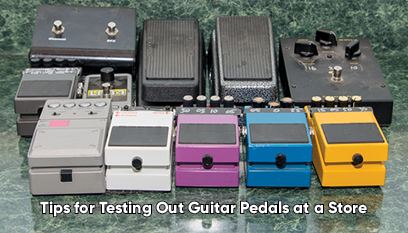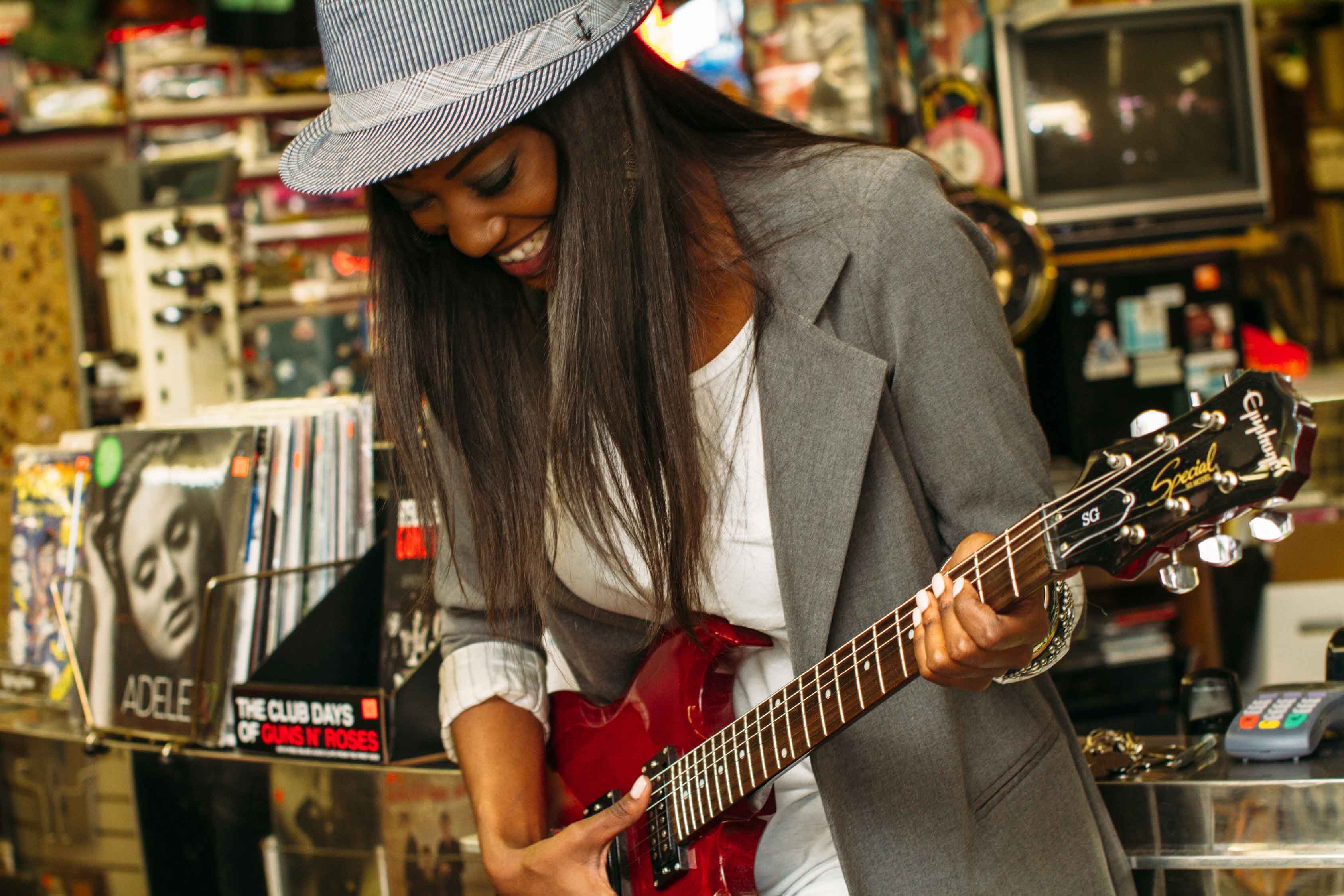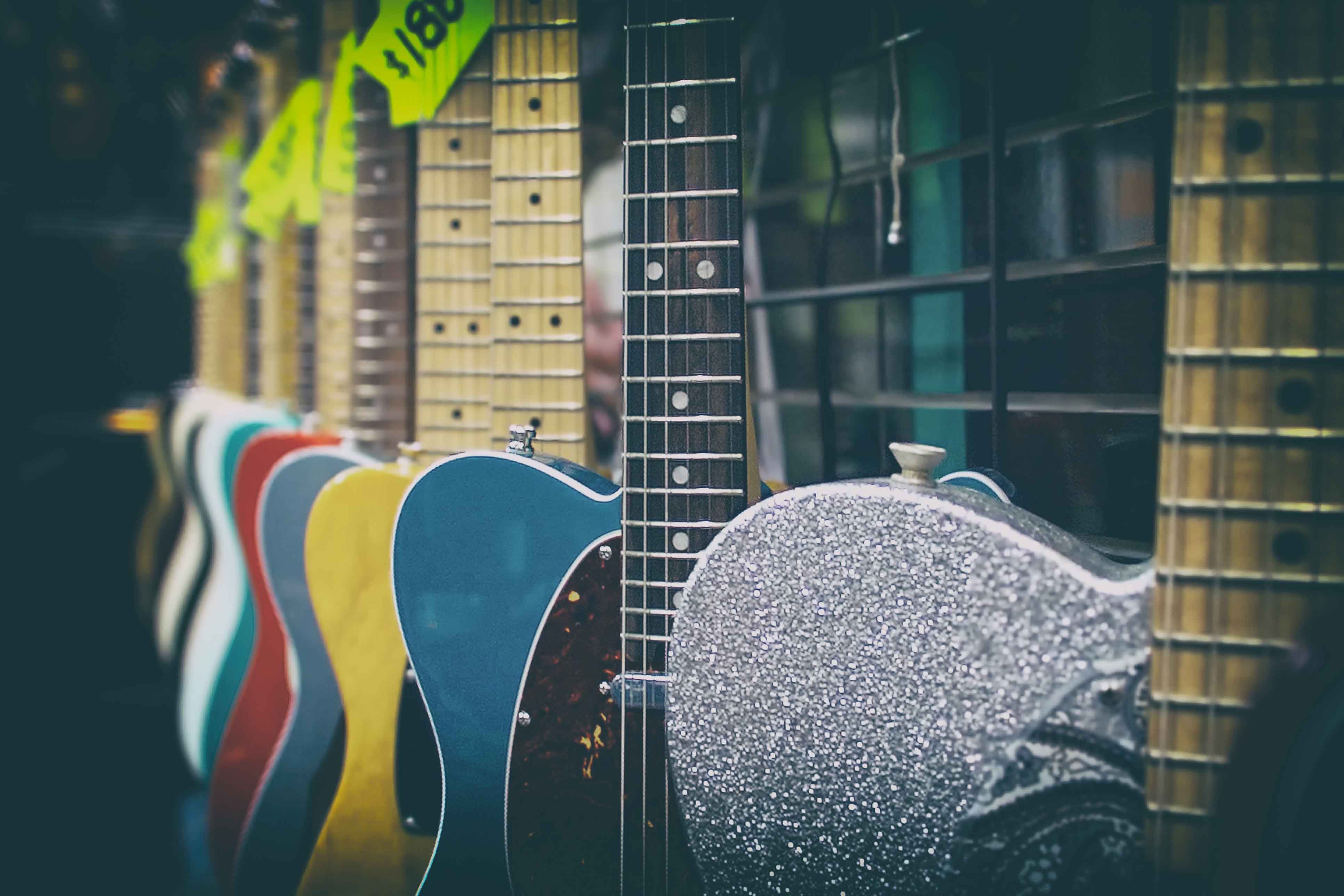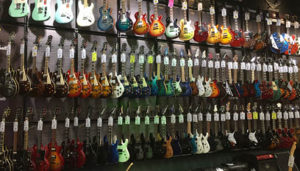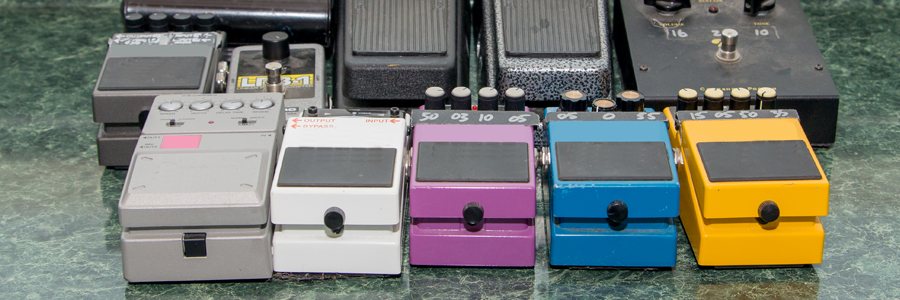 Whether you’re at a huge chain like Guitar Center or your local independent music store, shopping for effects pedals can be a little intimidating. How do you make sure you’re making a good decision? And what exactly is the etiquette for playing loud instruments in a store?
Whether you’re at a huge chain like Guitar Center or your local independent music store, shopping for effects pedals can be a little intimidating. How do you make sure you’re making a good decision? And what exactly is the etiquette for playing loud instruments in a store?
When you are shopping for guitar pedals, you are much more likely to be happy with your purchase if you test it out first with your own equipment (or the closest thing that the store has). Online reviews and YouTube demos can be really helpful, but ultimately you have to like how the pedal sounds with your guitar and your amp.
That may seem like strange advice for me to give, since this site is full of recommendations for gear you can buy online. But who doesn’t love a really great brick-and-mortar music store? I just make sure never to buy any music gear (online or in person) that can’t be returned.
Try It Out With Your Own Gear, or the Closest Thing to It
You obviously can’t try out guitar pedals all by themselves. You need a guitar and an amp. (Or a bass and an amp, if you are experimenting with using guitar pedals with a bass.) Choose whatever the store has that is closest to the gear you’d be using at home — or, if you’re really serious, bring your own.
Bringing your own gear has a few advantages. You won’t be distracted by store-model guitars that don’t sound quite right or are in need of a set-up. If you play guitar as a lefty, you won’t have to worry about finding a decent lefty guitar in the store. It will also make it clear to the staff that you’re not a random tire-kicker.
Beware of any music store that does NOT let you try stuff out, or hassles you for taking your time. Personally, I try not to give my money to unhelpful jerks. When the salespeople are knowledgeable and nice, I feel great about making a purchase!
But what if you know you’re just browsing? It’s totally OK to be up front about that. As long as you’re not camping out for hours so you can fiddle with a dozen pedals you have no intention of buying, you should be fine.
Have a Few Songs in Mind
Before you get to the store, think of a few songs that would be ideal for testing the effects you’re interested in. (Don’t pick the songs based on how well they showcase your mad skillz. The other shoppers and the staff do not care if you’ve recently mastered “Eruption.”) Play the same song using different makes and models of pedals so you are making an apples-to-apples comparison.
Having a song in mind probably sounds like a lame suggestion, but it’s easy to get self-conscious in music stores. You don’t want your mind to go blank once you’re all set up to play.
You can obviously play whatever you want, but it’s nice to switch it up. Partly thanks to the famous joke in “Wayne’s World,” demoing “Stairway to Heaven” is considered hopelessly cliche. The staff at the store will appreciate hearing something other than “Smoke on the Water,” “Layla,” or “Enter Sandman,” too.
A Note About Multi-Effects Pedals
Testing out multi-effects pedals can be overwhelming, because they all do a variety of things and many of them are rather complex. To help narrow down your choices, consider why you’re in the market for a multi-effects pedal. What tone are you trying to achieve? What other pedals do you have? How much space do you have on your pedal board? You probably don’t need to demo every setting to find out if this unit will meet your needs.
Respect Other People and the Equipment
When you’re trying out gear in a music store, a little self-awareness goes a long way. Be considerate of the people around you. If the customer next to you is playing a delicate folk piece, blowing them out of the water with your favorite Black Sabbath cover is not cool. Even if you nail it, you’ll look like a tool. (I hope somebody out there likes that pun as much as I do.)
If you are seriously considering buying something and you feel you have to crank up the volume to make your decision, ask. Larger stores will have small soundproof rooms for testing out gear (especially amps) without blasting the other shoppers.
Treat the equipment with care, too. The future owner of this gear — whether it’s you or someone else — would prefer it without a bunch of scratches and dings from being knocked around. Don’t tune a guitar to some outlandish tuning and walk away. Make a reasonable effort to put stuff back where it belongs. If it came from a high shelf, though, keep in mind that stores may not want customers putting it back for liability reasons.
Bring a Friend if You Can
We all know “that guy” (or gal) when it comes to gear. They’re super-knowledgeable and can always get the best out of a piece of equipment. If you’re shopping for a piece of gear that’s new for you, it’s a great idea to bring someone who knows more than you do. (This is really handy for bargain-hunting at yard sales, too.) Plus , if you end up with a really chatty sales clerk, your friend can talk with them while you focus on playing.
Take Advantage of the Staff’s Knowledge
Most music store staff members are experienced musicians and teachers. The chatty ones are probably just as excited as you are about the gear you’re trying out, and are happy to be doing something other than cashing out small orders of strings, sticks, or reeds.
If you try a pedal and it doesn’t do it for you, explain what you’re trying to do and ask the clerk if they have something else in stock that might fit the bill. They may know about new merchandise that just came in and isn’t on the floor yet. You could get first crack at it!
Check the Store’s Return Policy
It’s smart to check the return policy before you buy, just in case. If you play in a band, you may discover that your new pedal sounded awesome on its own but doesn’t mesh well with the full ensemble. You can always sell unwanted pedals through Craigslist, Facebook, Reverb, or eBay, but returning them to the store for full price is ideal.
Consider Renting
What if you try out a pedal in the store, but you’re just not ready to pull the trigger? Consider renting the pedal instead. Pedal Genie is basically Netflix for guitar pedals, back when Netflix mailed out DVDs. You can sign up and experiment to your heart’s content — as long as you’re willing to wait for the mail to catch up with you.
Buying Gear From Friends
Over the years I’ve bought several pedals and guitars from friends. It’s great for the seller to know that the gear is staying in the family. If they end up having the perfect use for it in a later recording session, they’ll still have access to it without having to go buy a new one. The buyer will have the advantage of knowing all about the equipment’s history, and the reason why it is being sold.
My favorite benefit of buying gear from friends is that the demoing process is much more relaxed. Friends are usually willing to loan the gear for a week — sometimes even longer — so the potential buyer has plenty of time to try it out, think about it, and try it out again.
Take Your Time
If you’re about to put down serious money — and we all have our own definition of serious money when it comes to gear — it is very important to take your time so you can make the right decision. This may mean devoting half an hour or more to an amp, and maybe even coming back another day after you had a chance to do some more research. At the end of the day you want to be happy with your purchase.

